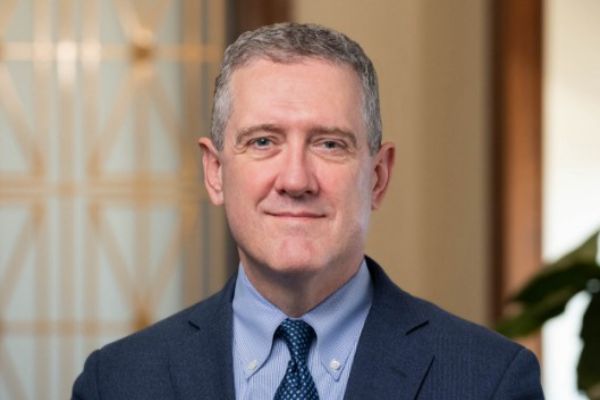James Bullard
James “Jim” Bullard is the former president and CEO of the Federal Reserve Bank of St. Louis. He became president on April 1, 2008, succeeding William Poole. On July 13, 2023, he announced he would be leaving the St. Louis Fed effective Aug. 14, 2023, to become the inaugural dean of the Mitchell E. Daniels, Jr. School of Business at Purdue University, effective Aug. 15, 2023.
View Statements and Speeches of James Bullard.
Bullard is a noted economist and scholar, and his positions are founded on research-based thinking and an intellectual openness to new theories and explanations. As a participant on the Federal Open Market Committee, he was often an early voice for change. Of note:
- Shortly after the U.S. declared the COVID-19 pandemic to be a national emergency and health authorities recommended a curtailment of economic activity, Bullard argued that the goals of macroeconomic policy should be different for this crisis than for a traditional economic recession. This economic crisis was directly related to the actions needed to contain the virus and invest in public health. As a result, optimal policy could be better described as maintenance and support—more a matter of insurance than traditional stimulus—with a focus on keeping disrupted households and businesses whole by providing relief during the pandemic adjustment period.
- In 2016, Bullard announced a new approach for the St. Louis Fed’s near-term U.S. macroeconomic and monetary policy projections. The new approach is based on the idea that the economy may experience one of several possible persistent regimes, which involve a combination of recession or no recession, high or low productivity growth, and high or low real returns on government debt. While switches between regimes are possible, they are difficult to forecast. This contrasts with the more traditional approach to monetary policy projections, which assumes that the economy will converge to one single, long-run steady state.
- Earlier in his tenure, Bullard warned about the possibility of a Japanese-style deflation in the U.S. His paper on this topic, published in 2010, helped move the FOMC’s thinking toward a second round of quantitative easing.
- He argued strongly that the timing of monetary policy decisions, including interest rate policy or the pace of asset purchases, should be driven by incoming data on the state of the economy as opposed to the calendar.
- During the financial crisis, Bullard also advocated for establishing an explicit inflation target, which the FOMC has since adopted. And he argued that the Committee should defend the target when inflation is below as well as above it.
- In 2008, Bullard was an early voice on the potential consequences of zero-interest-rate policy. He argued at the time that the Fed might need to turn to quantitative measures of monetary policy in order to avoid deflation.
Bullard made public outreach and dialogue a priority to help build a more transparent and accessible Fed. He regularly engaged with many audiences—including academics, policymakers, business and labor organizations, charities, students and media, among other public groups—to discuss monetary policy and the U.S. economy and to help further the regional Reserve banks’ role of being the voice of Main Street.
A native of Forest Lake, Minn., Bullard received his doctorate in economics from Indiana University in Bloomington. He holds Bachelor of Science degrees in economics and in quantitative methods and information systems from St. Cloud State University in St. Cloud, Minn.


